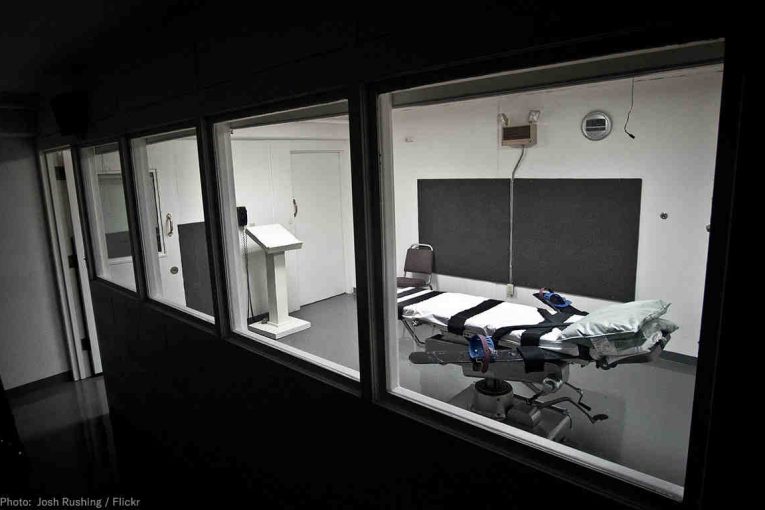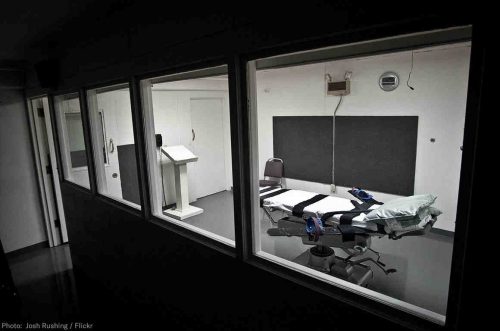

By Maeve Haggerty
ATMORE, AL – Jamie Mills, a prisoner at the Alabama Correctional Facility, was executed here Thursday despite proof, said the Equal Justice Initiative, of falsified testimony and the legal actions taken to petition for a review of evidence and a stay of execution.
Mills, said the EJI, appealed to the U.S. Court of Appeals for the Eleventh Circuit for a stay of execution because of new evidence that made the lead witness’s testimony in his trial unreliable.
He additionally appealed the denial of his motion for a preliminary injunction, arguing that the state’s recent actions of restraining prisoners on the gurney for extended amounts of time violated several constitutional rights.
The court denied both motions.
In describing the background of the case, the court wrote that in 2007 Mills was given the death sentence for the murders of Floyd and Vera Hill. The court also wrote Mills petitioned the state and Supreme Court to review his case in 2008, 2010, 2012, 2020, 2021 and 2022.
All of these motions were denied by the courts.
The Court does not mention the evidence Mills sought to have re-examined. The Equal Justice Initiative published articles describing the questionable evidence that led to Mills’ conviction, specifically the testimony of the lead witness, which the conviction was largely based on.
EJI wrote Mills, Benji Howe, and Mills’ ex-wife Joann Mills were all arrested for the murders. “Jamie and JoAnn Mills were arrested after physical evidence from the crime, including the murder weapons, was found in the trunk of their car.”
EJI wrote, “JoAnn Mills told police in two different statements that she suspected Benjie Howe had planted the weapons in their car and that Mr. Howe had brought stolen items to their home in the past.
“It was only after police threatened JoAnn Mills’s children and falsely claimed that DNA evidence on the murder weapons matched Jamie Mills that she gave a third statement implicating Jamie. Other than the evidence found in the unlocked trunk, JoAnn’s third statement was the only evidence connecting Mr. Mills to the crime.”
During Joann Mills’ testimony at Mills’ trial, she and the prosecutor affirmed multiple times that she had not been offered a lesser sentence in exchange for her testimony in Jamie Mills’ trial. However, 10 days later, Joann Mills was given a reduced sentence (life with the possibility for parole) in her own trial, said EJI.
An affidavit from Tony Glenn, Joann’s lawyer, revealed Joann Mills did meet with state officials prior to Jamie Mills’ trial and a deal was discussed, added EJI, adding Judge Adubu wrote in a concurring opinion regarding Mill’s appeal of the denial of his habeas corpus writ, “Glenn affirmed that he engaged in pre-trial discussions with the district attorney and the victims’ daughter regarding JoAnn avoiding the death penalty if she ‘testified truthfully’ at Mills’ trial.”
The court wrote that on March 27, 2024, the Supreme Court of Alabama scheduled Mills’ execution for May 30 and May 31, 2024. Soon after, Mills filed motions for a stay of execution. The court writes, “On April 5, 2024, he moved the district court that had denied his habeas petition for relief under Federal Rule of Civil Procedure 60 and for a stay of execution.”
These motions were denied, said EJI.
On April 26, Mills filed the action under review by the appellate court against the Commissioner and state officials, arguing the state would leave him restrained on the gurney for “an undue length without access to counsel in violation of his rights to access the courts, to counsel, to due process, and against cruel and unusual punishment” seeking injunctive and declaratory relief, the Court writes.
The Court stated by May 1, 2024, Mills had not filed for preliminary injunction or expedited discovery and therefore the district court ordered “for good cause” that he must file any further motions no later than May 3, 2024. And, May 3, Mills filed for preliminary injunction, on May 14 the district court heard the motion, and on May 21, the district court denied the motion, the Court writes.
On May 24, Mills appealed the ruling to the U.S. Court of Appeals. In response to Mill’s argument that being restrained on the gurney for extended amounts of time violated his Eighth Amendment rights to not experience “cruel and unusual punishments” the court wrote, “The Amendment does not mandate the ‘avoidance of all risk of pain in carrying out executions.’”
The Court also wrote that “the district court found ‘legitimate penological reasons’ to explain why several inmates have recently been strapped to the gurney for longer durations, including the difficulty of gaining intravenous access and delays in transporting witnesses to the chamber” and “for the most recent execution, the inmate spent less than an hour on the gurney.”
Mills argued he had no cause to bring up the current action for preliminary injunction any sooner than he did, but the Court upheld the district court’s previous decision, arguing, “A reasonably diligent plaintiff would have sought a stay much sooner, and the district court did not clearly err in finding that Mills’s ‘inequitable conduct,’ weighed against a stay.”
In a concurring statement, Judge Adubu wrote, “While I concur in the denial of Mills’ motion to stay his execution based on Circuit precedent, I write separately to ensure Mills’ concerns regarding Alabama’s execution process are appropriately acknowledged.”
Adubu, reported EJI, discussed several recent executions that Mills brought up in his motion—the executions of Joe James, Alan Miller, James Barber, and Kenneth Smith.
Adubu wrote, “In James’ case, he was placed on the execution gurney two hours before IV access was established to begin the lethal injection procedure. An independent autopsy determined that James suffered multiple puncture wounds, bruising, and cuts prior to the execution, and he was unable to give his last statement due to being unconscious when the curtain opened.”
Adubu wrote, added EJI, that in Barber’s case “he was placed on the execution gurney—with the IV in place—for over an hour to allow for execution witnesses to be transported to the viewing area.”
Adubu expressed concern about the conditions of executions in Alabama, writing, “While precedent does not establish that these conditions are unconstitutional per se, Alabama’s pattern of delay during executions is troubling.”